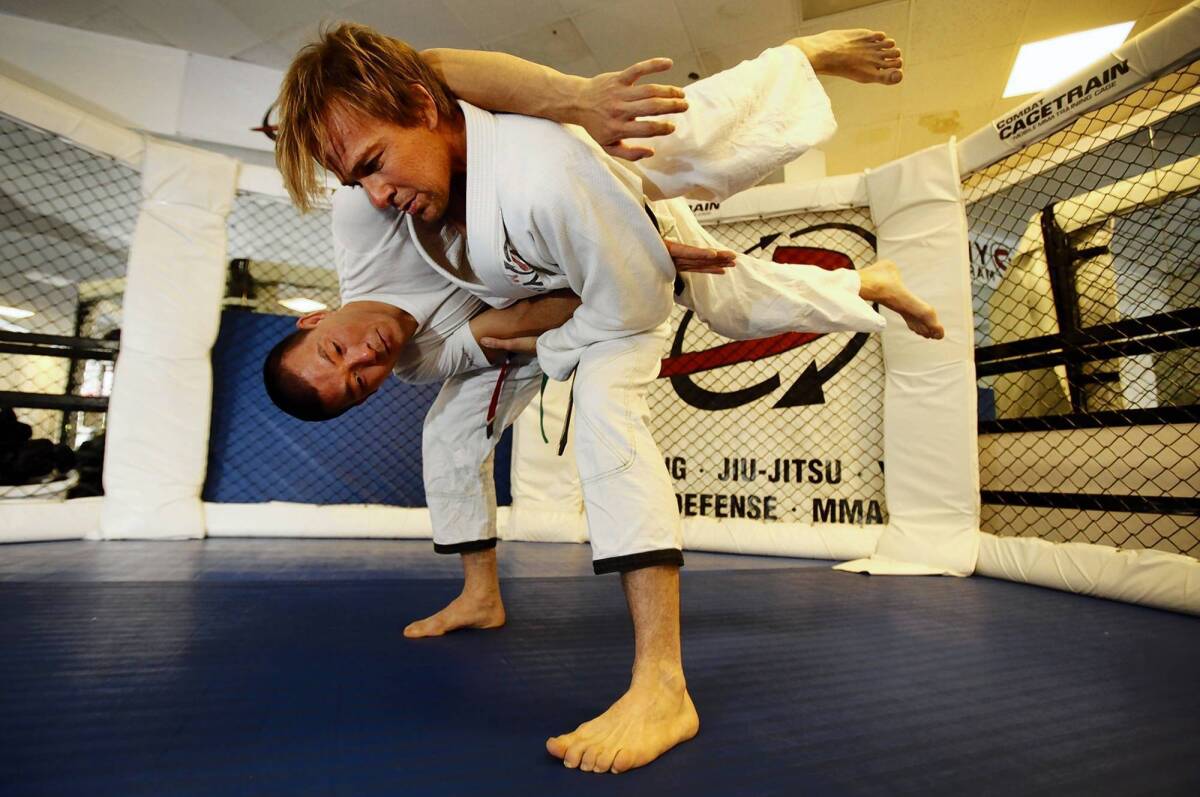For ‘Dexter’ actor Sean Patrick Flanery, jiujitsu is an unbeatable workout

Sean Patrick Flanery plays an ex-cop in the eighth season of TV’s “Dexter,” starting June 30, and a music teacher in the new film “Broken Horses.” But there’s another big role in his life: Flanery, 47, teaches and trains in Brazilian jiujitsu at his own Los Angeles studio, Dynamix.
You have trained in various kinds of martial arts. What made you favor Brazilian jiujitsu?
The first time I sparred, my sparring partner was 135 pounds soaking wet. I am 170 pounds. I rolled with him, sparring, and he wrapped me up in a knot. He could have done anything he wanted to me. He could have taken every one of my possessions, and there would be nothing I could do. I had been a martial artist for a long long time, and I realized that this guy wasn’t even a black belt. He was a blue belt, the first belt, and yet he could do anything he wanted to me and there would be nothing I could do to prevent it. I wanted that power. I wanted to know, what do I need to exchange to get this? And the answer was time, concentration, focus and dedication. And it became so important to me to this very day.
How does Brazilian jiujitsu differ from other martial arts?
The concepts and the philosophy are different. For example, striking is punching. Any striking art is reliant on ranges, and ranges in a striking art require a compliant partner. For me to punch you, you have to be in range of my punch. But you could turn and run. But with grappling (the application of holds and locks to immobilize an opponent) in Brazilian jiujitsu, you can’t leave. I don’t need anything from you. Once I have hold of you, everything I have is in me and not you. That is the wonderful thing about grappling. All your instincts in grappling are wrong. You have to relearn pretty much everything. If I am on top of you, your instinct is to turn and protect your face. But if you turn around, I can dish out all the harm and you can dish out none, and there’s nothing you can do to defend it.
How does practicing Brazilian jiujitsu extend into your daily life?
As an actor, I don’t have a lot of control over my future and destiny. A lot of actors sit around waiting for the phone to ring. With my academy, I don’t have time to sit around. It relieves the potential bitterness and resentment that can develop from sitting around and waiting for acting roles. ... There is something incredibly empowering about walking into a room and knowing, “Wow, if anything happened, I could put all of these people to sleep.” I don’t have to. And it doesn’t mean I am going to, but it changes the way you walk into a boardroom or [deal with] bullies.
You received your black belt in 2008. How long did it take to get it, and what does it mean?
Typically people say it takes 10 years to get a black belt, and it might take 10 years if you train four times a week. I got mine in seven years, but I pretty much lived at the academy. At the highest level, you have acquired all the rudimentary tools with which to do your journey, but it doesn’t mean you’ve mastered them. It certainly doesn’t mean you’re the best out there. ... To be a black belt, you have to have all the information and to be able to execute it properly, and you have to be able to convey the information briefly, concisely and articulately for future generations of Brazilian jiujitsu practitioners. Having a black belt is one of my greatest achievements and something I’m very proud of, and I want to be the best teacher I can be.
Why was it important for you to open your own studio and teach?
I wanted to combine the Brazilian technique with the American business model. I thought that could be successful. And I wanted a place to promote it and to spread concepts and philosophies that are very different from contemporary jiujitsu, more of a fundamental fighting style where your goals are to stay safe and advance your position slowly and methodically until you can dole out all the harm and receive none and then you win the fight. And the academy is a sanctuary. Inside the doors, everyone is the same. We had [director] Guy Ritchie in here yesterday, and we have doctors, lawyers, [talent] agents, and we have people who train here all across the board, but rarely would they ever talk shop. We have a common goal, and we’re all in pursuit of it, and we all help each other out.
ALSO:
Jane Fonda on yoga for boomers
Gear: Home gyms don’t have to take up a lot of room
Boxer Wladimir Klitschko on training, diet and sibling rivalry






